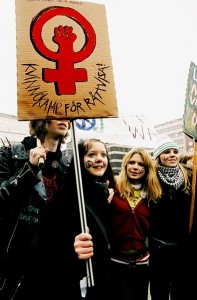not resorting to pettiness: the problems with feminist in-fighting
Last week, freelance writer, Eleanor Robertson live-tweeted her disgruntled responses to Mia Freedman’s 2009 memoir Mama Mia: a Memoir of Mistakes, Magazines and Motherhood and, naturally, a Twitter shit storm ensued. Freedman’s loyal readers jumped to her defense, shouting (as much as one can shout through Twitter) that Robertson’s criticisms were ‘mean’ and that she was taking a ‘cheap shot’. I think a better question to ask might be: was it relevant, was it necessary, and is this type of ridicule aiding or abating valid feminist criticisms?
I have to wonder from what place Robertson’s criticism comes from. Is she tackling a social problem head on or bitching about a woman she doesn’t like? Rather than shining a light on a problematic aspect of current feminism, Eleanor trots out condemnations against Freedman that are well worn and unsurprising; the critical feminists among us know that Mia has written some incredibly disappointing articles for Mama Mia and holds some controversial views (her infamous alcohol vs. rape debacle and abysmal attitude towards sex work are cases in point), but instead of consistently dragging one woman through the mud, we need to look at this issue in a wider context and start talking about why it is that a white, upper-middle class woman with problematic views is given such a big platform from which to share them. Freedman’s more conventional ideas make her relatable and largely unprovocative to the white, educated, middle class women and The Age readers who make up a large chunk of her fan base. Hers is a voice that does not do much to challenge them, does not ask them to think too long or too hard about larger, troublesome issues, and her role as the face of White Australian Feminism does nothing to confront the lack of intersectional diversity in feminism.
Feminists with a left bent are, I’m sure, aware of the criticisms circling around Freedman, Mama Mia and her brand and have probably contributed to it themselves (I don’t exclude myself from this). Robertson tweeted in reply to an angry Freedman reader that ‘I…think she is harming people by her words and actions and should be stopped from doing that.’ Fair enough, but aiming to knock Mia Freedman off her perch will not change much at all. Standing in line behind her is a throng of women from similar socio-economic and cultural backgrounds (should Mama Mia ever fold, xoJane is there to takes its place) writing about women’s issues from a narrow and homogenous headspace. Cut off one head and another grows. Instead let’s start talking about why popular feminism is a vat of vanilla, unchallenging and often unthreatening voices. What are we afraid of? Challenge the people who are putting forth ugly and problematic views, yes, but we also need to dismantle and diversify. Mama Mia, ‘Australia’s largest female website’, is getting thousands of site visitors per day with articles about how to open a tin of Milo and ‘Can straight men and women REALLY just be friends?’ while outspoken, diverse and thoughtful feminist online publications (hello, Lip!) are not exactly operating out of water front offices in Sydney’s inner suburbs.
Feminism is not a be all and end all, but a continuing conversation and a movement for which growth and education is imperative, and to continue to have this conversation, criticism is important and inevitable. It is our responsibility to be aware of problematic voices in feminism and to be held accountable for our own actions, but continually ridiculing a woman because we don’t like her (even if it feels justified) is not productive. It is zeroing in on one aspect of a much bigger problem. Let’s not result to pettiness, we’re better than that.



this is a great piece! i couldn’t have said it better myself.